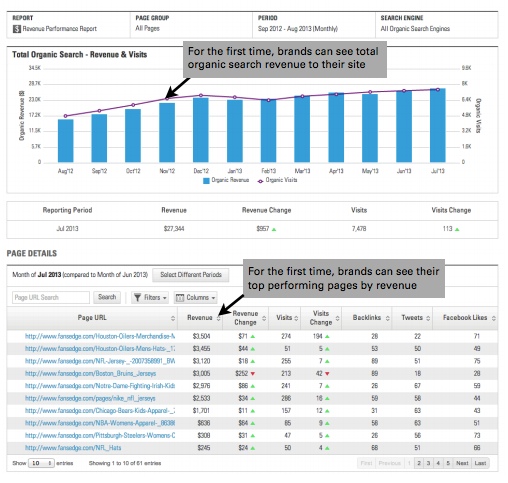While Google was quietly planning its release of fully secure search, BrightEdge had already launched new optimization and tracking features that analyzed websites from a page level to fill the soon-to-be gap and prepare for the shift in marketing mindset that BrightEdge said it already saw on the horizon.
Page reporting is a tracking feature in BrightEdge that shows the value of pages from organic search traffic. This report complements the already existing “page manager” feature, which helps BrightEdge customers optimize at the page level, not just the keyword level.
“The way page reporting works is we integrate with site analytics, pull in page data and overlay that with keyword and rank data,” said Brad Mattick, VP of marketing and products at BrightEdge. “And then we let businesses define page groups to model their business structure.”
Mattick said this offers “powerful and flexible” ways of understanding the performance of pages in groups for both B2Bs and B2Cs based on a site’s defined conversions.

Mattick said Google’s secure search move helps marketers to step away from “intermediate metrics” such as keywords, and start looking at the performance of content as a whole.
“For any search marketer who has been paying attention, secure search should not have been a surprise,” Mattick said. “This is a very positive change for the industry.”
So what can those marketers do who want to make a transition from the keyword-focused model of success to a new paradigm?
Mattick pointed to the “triangulation” method in the interim, whereby a person can take into account the keyword’s search volume, its rank in the search results and the click rate to estimate how much traffic a keyword is driving (which Mattick said is built into BrightEdge’s tools already).
Mattick said you can also factor in revenue if you have a typical conversion rate on your site or on pages of your site, or a typical transaction value that you can apply to the equation.
“But the really important point in all this is that it’s just estimation,” Mattick said. And because estimation can only take you so far, Mattick said one thing marketers can know for sure when tracking progress is visits, conversions, and rank by page.
“People visit pages and they convert on pages not keywords,” he said. “Start with the value of a page.”
